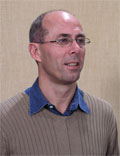Arranged jointly with the Infotech and Modern Optics and Fotonics graduate schools
Monday the 15th - Thursday the 18th of March, 2010
University of Oulu
|
 |
Course Objectives:
The objectives of this course are to: (i) provide a possibility for the student to acquire knowledge about the physical properties of light and its impact and interaction with biological tissue in terms of optical properties, spectroscopy, polarimetry, and interferometry through the use and design of appropriate optical components; (ii) understand the engineering and practical applications of optics related to diagnostics, sensing and therapeutics of the human body; (iii) generate interest in students to pursue research in optics-related areas.Learning Outcomes:
The outcomes of the course is to: (i) understand the physics behind biomedical optics; (ii) the capability to apply advance mathematical tools in optics-based engineering; (iii) derive and apply fundamental processes of light interaction with biological tissue; (iv) describe analytical and statistical light interaction models; (v) describe, model, value and verify light-tissue interaction models; (vi) describe, apply and value dynamic light scattering, optical coherence and photoacoustic applications in biomedical.Course Description:
Fundamentals of biomedical optics, covering optical properties of biological tissue, light transport models especially light transport in tissue and the therapeutic window.Measurement of tissue optical properties. Applications and methods reposing on the fundaments such as diffuse reflectance spectroscopy, polarimetry, and interferometry, Quasi elastic light scattering, Optical Coherence Tomography and Photoacoustic imaging.
Major Topics:
- Biomedical optics fundamental principles
- Light propagation in tissue and measurement of tissue optical properties
- Optical spectroscopy of physiologic chemicals and spectrometers
- Optical Interferometric diagnosis and biosensing
- Optical imaging approaches for biomedical diagnostics
Participants:
Graduate students and professionals in biomedical and electrical engineering, physics, biology and medicine with an interest to learn about several biomedical optics issues describing both diagnostic and therapeutic optical methods in medicine.Prerequisites:
Introduction to Biomedical Engineering or Anatomy and physiology, Biomedical Signal Processing or Medical images and basic knowledge in electromagnetic radiation and optics.Examination:
4 ECTS credit points are earned after participating during the full course and passing the final written exam.Literature:
- Optical-Thermal Response of Laser-Irradiated Tissue. (Hardcover) Welch A.J. and Van Gemert M.J.C. (eds), Springer, 2010. ISBN10: 904818830X
- An Introduction to Biomedical Optics. (Hardcover) Splinter R. and Hooper B.A. (eds). Taylor & Francis Group, 2006. ISBN10: 0750309385
- Biomedical Optics: Principles and Imaging. (Hardcover) Wang L.V. and Wu H. (eds) Wiley, 2007. SBN10: 0471743046
- Optics. Hecht E., Addison Wesley Publishing Co., 2001. ISBN10: 0805385665
- Articles and ebooks on list at start.
Registration:
By 01.03.2010, jari.viik@tut.fi
Tentative Schedule:
| Date | Time | Course Program |
| Mo 15.03.2010 | 09.00-10.00 | Registration & Coffee |
| 10.00-10.15 | Introduction by Professor Timo Jämsä | |
| 10.15-11.00 | What is biomedical optics | |
| 11.00-12.00 | Tissue optical properties, refractive index & absorption | |
| 12.00-13.15 | Lunch break | |
| 13.15-14.30 | Tissue optical properties, scattering and anisotropy | |
| 14.30-14.45 | Coffee break | |
| 14.45-16.00 | Optical transport in tissues | |
| Tu 16.03.2010 | 09.15-10.45 | Light transport in scattering and absorption media (Lab/Demo) |
| 10.45-11.00 | Coffee break | |
| 11.00-12.00 | Measurement of optical properties | |
| 12.00-13.15 | Lunch break | |
| 13.15-14.15 | Monte Carlo simulation and estimation | |
| 14.15-15.30 | Coffee break | |
| 14.30-16.00 | Measurements with MC (Lab) | |
| We 17.03.2010 | 09.15-10.00 | Skin optics |
| 10.00-10.15 | Coffee break | |
| 10.15-12.00 | Diffuse reflectance spectroscopy | |
| 12.00-13.15 | Lunch break | |
| 13.15-14.30 | Optical transport model for spectroscopy | |
| 14.30-14.15 | Coffee break | |
| 14.15-16.00 | Spectroscopy estimation - chromophore content (Lab) | |
| Th 18.03.2010 | 09.15-10.30 | Quasi Elastic Light Scattering application - Laser Doppler Flowmetry |
| 10.30-10.45 | Coffee break | |
| 10.45-12.00 | Optical Coherence Tomography application | |
| 12.00-13.15 | Lunch break | |
| 13.15-14.15 | Photo Acoustic Imaging application | |
| 14.15-14.30 | Coffee break | |
| 14.30-16.00 | Written exam |
![]()
